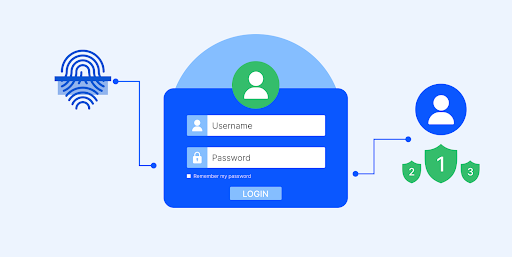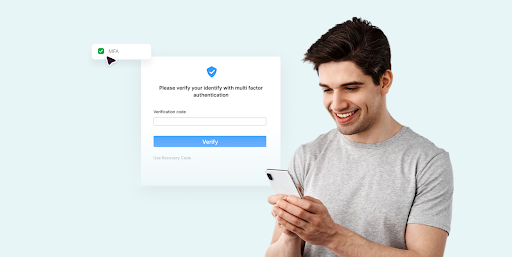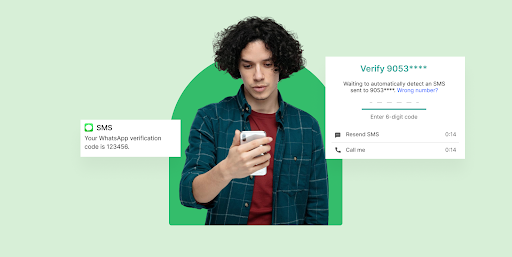Cybersecurity is a prevalent and growing threat to businesses. However, few business owners know how many confirmed breaches are due to human error—specifically, weak or compromised passwords. This simple, effective defense mechanism is often ignored and frequently exploited by hackers and cybercriminals.
In addition to practicing strong password hygiene, one of the most powerful steps you can take to improve enterprise security and resilience is implementing multifactor authentication (MFA).
MFA significantly increases the obstacles for any potential attackers, making the company’s accounts less appealing as a target for cyber attackers.
In this blog post, we will share how multifactor authentication works, types of MFA solutions available, features to look for in an MFA provider, highlight three critical questions to ask your MFA providers, and finally, a list of the best MFA providers.
What is multi-factor authentication (MFA)?
Multi-factor authentication (MFA) is a security process that requires users to provide two or more verification factors to gain access to an online account or application. When you sign into an account, you “authenticate” your identity by providing a username or password. Multifactor authentication requires you to provide additional verification “factors” besides your username and password.
These factors come from one or more of three different categories:
1. Something you know: This is typically your password, but it could also be a PIN, security questions, or a passphrase.
2. Something you have: This could be a physical token, a smartphone receiving a code via SMS or an authenticator app, a security key, or a trusted device.
3. Something you are: This involves biometrics, such as fingerprint scanning, facial recognition, voice recognition, or iris scanning.
How does MFA work?
MFA is like adding an extra lock on your front door to keep your home safe. It’s a security measure that requires users to provide more than just a password to access their accounts.
After a user enters their password, they might need to verify their identity with something they have (like a code sent to their phone) or something they are (like a fingerprint).
This added layer of security makes it much harder for someone to break in and access a user’s account, even if they’ve somehow gotten hold of their password. It’s a smart, straightforward way to keep your information and your community safe.
The main types of MFA solutions
Several types of multifactor authentication solutions are available, each adding an extra layer of security to your login process.
To understand how MFA works, let’s break some of the common ways to authenticate your identity into the three main categories we previously identified:
Something you know
This knowledge-based authentication factor could be a password, a PIN number, or the answer to a security question. This authentication factor is semi-permanent, meaning it won’t change each time you log in and must be updated manually by the user to maintain its security.
Something you have
This type of authentication factor relies on a third party to deliver a temporary code or PIN number. Common examples include:
1. SMS-based authentication: This is one of the simplest MFA formats. The user, after entering a password, is sent a one-time code via a text message that needs to be input to complete the login process. It's convenient but less secure if an SMS is intercepted.
2. Email-based authentication: This method delivers to the user a particular code or a link through email. The user will have to input this code or open the link to get verified. It is easy to use but suffers from the same sort of vulnerabilities as the SMS-based methods.
3. Authenticator apps: Google Authenticator, Authy, and Microsoft Authenticator are some of the applications generating time-based codes; the user inputs such a code after his or her password. These codes have a lifespan of only 30 seconds each.
4. Hardware tokens: These physical devices generate authentication codes. USB tokens, key fobs, or another piece of hardware are very secure, but not practical to keep track of or carry around.
5. Push notifications: The user receives a push notification on their mobile device, asking if they are trying to log in. They only need to approve the request. It's easy for any user to do so.
6. Smart cards: These are physical cards with an inserted chip put into a card reader, usually combined with a PIN. It's often used in corporate environments for secure access.
Something you are
This authentication factor is inherent or unique to the user, such as a fingerprint, facial recognition, or voice. Biometric authenticators are popular on mobile devices, since they are hard to copy or duplicate.
You can mix and match these solutions depending on how much security you need and how much convenience you'd like to allow your users. The goal is to ensure that even if someone has your password, they can’t get into your account without passing that second layer of defense.
How to find the best MFA solution for your business
If you’re looking to invest in a multifactor authentication solution for your business, there are a few key factors you should keep in mind.
Easy set-up and fast time to market
First things first: The multifactor authentication solution itself should be straightforward and easy to use, with a clear, intuitive interface—for both the team managing it and your customers. Your customers should have no trouble completing the authentication process, whether they’re using an app, SMS, or another method.
On the backend, your team should be able to easily set up and manage the authentication flow from your security management platform or authentication provider.
For example, Plivo offers a well-documented API to help you set up MFA. Plivo’s API uses standard HTTP verbs and status codes, which makes it easy to integrate into your existing systems. Whether your development team prefers Python, Ruby, Node, PHP, Java, .NET, Go, or even cURL, the setup process is consistent and streamlined.

Rich features for better engagement
When it comes to integrating MFA into your applications and scaling delivery globally, having the right features in place can make all the difference.
Plivo supports real-time delivery report notifications so you can track how your messages are performing globally. This gives you valuable insight into your delivery rates and understanding the effectiveness of your messaging strategy.
We also provide pre-approved templates optimized for conversions. These ready-made message templates comply with industry regulations and are designed to maximize engagement and drive conversions.
These templates can save time and effort compared to creating messages from scratch. Instead, focus on what really matters—connecting with your audience.

Built-in security and data compliance features
When you’re looking for an multifactor authentication solution provider, consider the built-in regulatory and data compliance features it offers. Look for specific fraud protection tools that can protect your customers.
Plivo, for instance, provides Fraud Shield, a powerful solution designed to help reduce the risk of fraud like SMS pumping fraud and account token takeover.
Fraud Shield provides two key features: Geo Permissions and Fraud Thresholds. Geo Permissions let you control which countries your SMS traffic can reach, blocking and not charging for messages sent to unapproved countries.
Fraud Thresholds allow you to set a limit on the number of messages sent per hour to approved countries, helping prevent issues if the limit is exceeded.
Low operational costs
Cost is often one of the biggest concerns for companies vetting MFA tools. While there’s a wide range of tools with multiple pricing plans, it all boils down to your specific requirements and how much you use a particular service.
With Plivo, you only pay for what you use. There’s no authentication fee— we only charge for SMS and voice services. Plus, you can save even more with customized pricing and committed spend contracts tailored to your needs.
You won’t have to worry about purchasing or renting phone numbers either. Plivo’s pre-registered phone numbers are available for use without any monthly rental fees, streamlining your setup and reducing costs.
Compliance can often bring extra costs, but not with Plivo. There are no additional fees for regulatory compliance, so you can eliminate the overhead typically associated with compliance registrations.
And when it comes to protecting your messaging with Fraud Shield, there’s no extra cost involved. Plivo includes Fraud Shield at no additional charge, helping to prevent SMS pumping fraud without impacting your budget.

3 key questions to ask multifactor authentication solution providers
Ask potential partners these three questions to figure out which provider is the best fit for your MFA needs.
What authentication methods do you support?
A good MFA provider should be able to support a wide variety of authentication methods—including SMS, email, call, and hardware tokens.
The more choices you have, the more flexibility you can ultimately offer your customers. For instance, while SMS-based authentication may be easy and quick for some users, others will want to feel more secure using a method like biometrics. This is a case where more is more: the more authentication methods you can offer, the more convenience and security you can offer your customers.
How do you guarantee data safety and compliance?
With regulations like GDPR and HIPAA in play, you need to be confident that your provider is handling sensitive information properly. Ask about their encryption standards, their storage, and what kind of certifications they have.
For example, if the provider stores any authentication data, it must be encrypted both in transit and at rest. Ask about how they would handle a possible breach of your data and what controls are in place to prevent such a breach from happening.
Does your platform integrate with our existing tech?
Ultimately, an MFA’s efficacy is dependent on how well it integrates with your current infrastructure. You’ll want to know how easy it is to integrate MFA with your current tech stack—whether it’s your CRM, ERP, or any custom applications you use.
Ask about their support for popular platforms and whether they offer APIs or SDKs for custom integrations. For example, is there a native integration with Salesforce, or will you need to build a custom solution? Be sure to consider SSO and other identity management tools. A provider with strong integration capabilities will help you implement MFA efficiently, saving you time and resources in the long run.
At a glance: the 11 best MFA solutions for businesses
Here’s a quick comparison of the 11 most popular MFA solutions on the market today.
11 Best MFA solutions for businesses
1. Plivo

Reviews and ratings
Plivo is an easy-to-use, flexible option to implement communication APIs that will suit MFA. It is highly-rated for strong API documentation and great service, making Plivo a good option for developers looking for scalable solutions.
Key features
- Pre-approved message templates for maximum conversions
- Support for global SMS and voice messaging
- Real-time alerting for delivery reports
- No need to purchase or rent any numbers; use pre-registered numbers
- No compliance fees or extra fees for Fraud Shield
Limitations
- Does not support some specific advanced authentication methods, like biometric authentication.
Pricing
- Offers pay-as-you-go model
- The committed-spend contracts for committed volumes help save some money
Who is it best for?
Plivo is ideal for developers and businesses that are looking for the easiest and most cost-effective way to integrate MFA into their applications, thereby avoiding hassle with compliance management and fraud prevention.
2. Cisco Secure Access by Duo

Reviews and ratings
TrustRadius: 9.4 out of 10 stars
Cisco Duo is highly regarded for its comprehensive security features and ease of use, particularly for businesses of all sizes. It’s often recommended for organizations looking to build a zero-trust security framework.
Key features
- Almost every authentication method is supported, including biometrics.
- Passwordless authentication with push notifications and OTP.
- Seamless service integration with platforms like Office 365 and Fortinet.
- FIDO2, SOC 2, and HIPAA standards are supported.
Limitations
- Push notification delays may happen, according to several users.
- Certain issues with multi-device login support.
Pricing
- Starts at $3 per user per month
- 30-day free trial available
Who is it best for?
Cisco Duo is ideal for organizations of all sizes, especially those looking for a reliable, scalable solution to secure user access and integrate seamlessly with existing infrastructure.
3. Okta Adaptive Multi-Factor Authentication

Reviews and ratings
Gartner: 4.6 out of 5 stars
Okta’s MFA solution is a leader in the market, especially with its adaptive policies Okta allows better strength in security without frustrating users. It is highly favored by larger enterprises with a need for flexible and scalable identity management.
Key features
- Context- and behavior-aware adaptive authentication
- Integrations with a vast number of apps and services, including AWS and Slack
- Support for biometric authentication and the ability of users to log in without a password
- The product complies with all major standards, including PCI DSS, HIPAA, and GDPR
Limitations
- Costlier than some other MFA solutions available in the market
- Some users find the setup too complex
Pricing
- Starts at $2 per user per month for businesses
- 30-day free trial available
Who is it best for?
Okta is best for medium-sized enterprises and large corporations that are on the lookout for a fully functional identity management solution with top-notch security management and high integration capabilities.
4. Onelogin Workforce Identity

Reviews and ratings
OneLogin is one of the most popular MFA providers out there. It’s appreciated for its extensive app integrations and ease of use. In particular, users like OneLogin’s workforce identity and access management features deployed in the cloud or on-premises.
Key features
- Huge app catalog with over 6,000 integrations
- Multiple-directory identity management synchronization
- Adaptive MFA and SSO for internal and external users
- User and application lifecycle management
Limitations
- Users sometimes complain of integration and implementation difficulties
- Can be too complex for smaller businesses
Pricing
- Pricing varies according to deployment and usage needs
- 30-day free trial available
Who is it best for?
OneLogin is a great fit for SMBs and enterprises looking for a comprehensive workforce identity solution that includes robust MFA, SSO, and extensive app integrations.
5. Microsoft Entra ID

Reviews and ratings
Microsoft Entra ID is great for businesses that are already operating within the Microsoft 365 environment. The MFA provider is said to be relatively easy to set up and manage for enterprise businesses.
Key features
- Different ways of authentication from Windows Hello to FIDO2 to SMS
- Thousands of SaaS applications and internal applications can be integrated
- Conditional access policies dependent on the user and device risk
- Easy to use by both the user and admin, especially in Microsoft environments
Limitations
- Best suits organizations that offer their services through Microsoft services
- Will ultimately require you to purchase licenses for advanced capabilities
Pricing
- Part of Microsoft 365 pricing; additional charges may apply for advanced features
- 30-day free trial available
Who is it best for?
Microsoft Entra ID is best for organizations heavily invested in the Microsoft ecosystem, offering seamless integration and strong security features that enhance the overall identity management experience.
6. IBM Verify

Reviews and ratings
G2: 4 out of 5 stars
IBM Verify provides advanced MFA and passwordless authentication, integrating with IBM's suite of security products. IBM Verify is a full identity access management solution that integrates AI in its user-friendly authentication processes. Users like that it’s intuitive and easy to log into multiple systems.
Key features
- Adaptive authentication uses context-aware policies to evaluate access requests based on factors like device, location, and behavior.
- Risk-based authentication automatically adjusts authentication requirements based on the perceived risk level of each access attempt.
- Supports modern passwordless authentication methods, including passkeys and QR code authentication.
- Seamlessly integrates with other IBM security products.
Limitations
- Users say the system is complex and difficult to set up
- Expensive compared to other solutions on the market
- Multiple security flaws were discovered in IBM Security Verify Access (ISVA)
Pricing
- Pricing for IBM Verify is based on actual usage
- On AWS, pricing is based on contract duration. For instance, Verify Workforce capabilities for 100 workforce users is listed at $15,899.29/year.
Who is it for?
IBM Verify is ideal for businesses looking for a comprehensive cloud-based identity and access management solution from a trusted vendor. Although the platform has had some security bugs, it’s the best option for any businesses already using IBM’s suite of other products.
7. Google Authenticator

Reviews and ratings
Google App Store: 3.7 out of 5 stars
Google Authenticator is an app that generates a unique code to use during the login process in addition to a username and password. Google Authenticator can generate a verification code even without a network or cellular connection.
Key features
- Time-based, unique six-digit passcodes change every 30 seconds, providing a dynamic and secure authentication method.
- Generate passcodes locally on a device without requiring an internet connection or mobile service.
- Add and manage multiple accounts so you can centralize all MFA needs in one place.
Limitations
- Google Authenticator only provides one type of factor – something you have. This may not be sufficient security for all users.
- Users say the most recent update created sync issues, making it difficult to log in to their accounts.
Pricing
- Google Authenticator is free.
Who is it for?
Google Authenticator is a great option for businesses on a budget. It’s easy to use and intuitive for most users. However, it’s not a true MFA solution; it should be integrated with other authentication methods to secure user accounts.
8. Ping Identity MFA

Reviews and ratings
Users say that Ping Identity’s MFA solution offers robust security with a wide range of integrations and a strong focus on enterprise needs. Ping Identity works with biometrics, OTPs, and mobile authentication to secure your business’s systems.
Key features
- Ping Identity supports a range of authentication options, including mobile push notifications, email OTP, SMS OTP, TOTP authenticator apps, QR codes, magic links, FIDO2-bound biometrics, and security keys
- Ping Identity MFA is part of a larger suite of IAM tools by Ping One that can deliver enhanced security across vectors.
- Ping Identity MFA offers extensive policy configuration options. Administrators can create detailed MFA policies, specifying settings such as device selection methods, pairing key lifetimes, push notification limits, passcode failure limits, and lock durations.
Limitations
- Users say the solution is complex to set up and use
- The interface is clunky and difficult to integrate with other tools.
Pricing
- MFA is part of the PingOne subscription service, which starts at $20,000/year
- 30-day free trial available
Who is it for?
Ping Identity is best for large enterprises with complex identity management requirements. PingOne is best for businesses that need to find the right balance between security and user convenience, with support for various authentication methods including passkeys, biometrics, and push notifications.
9. LastPass MFA

Reviews and ratings
G2: 4.5 out of 5
LastPass MFA combines password management with robust MFA capabilities, offering adaptive authentication and a unified admin console. LastPass primarily caters to personal users, but also offers solutions for teams and enterprise businesses seeking to enhance their security protocols.
Key features
- Primarily known as a password management tool, LastPass offers MFA for LastPass password vault access.
- The Advanced MFA add-on offers MFA for VPNs, workstations, on-premises apps, and identity providers.
- LastPass MFA supports a wide range of authentication options, including biometric authentication, push notifications, authenticator apps, and contextual factors like location and IP address.
Limitations
- LastPass is most popular as a password management tool for individuals, and therefore may not have as many business-focused integrations.
- Reviewers on G2 cite login, autofill, and security issues that arise when using the app.
Pricing
- 14-day free trial available.
- LastPass Business starts at €6.50 per user / month, billed annually
Who is it for?
LastPass is best for sole proprietors, entrepreneurs, and small businesses seeking an affordable, easy-to-implement solution that enhances security without requiring extensive IT resources.
10. RSA SecurID

Reviews and ratings
RSA SecurID has built a long-standing reputation for strong security and a wide range of authentication methods, including hardware tokens. Like other solutions on this list, RSA SecurID is part of a full suite of IAM tools, including automated identity intelligence, authentication, access, and governance.
Key features
- Supports multiple authentication options, including hardware tokens, software tokens, mobile push notifications, and biometrics.
- Also offers temporary OTPs that can be used as MFA factors.
- Robust protection for remote access to corporate networks, applications, and resources; good for distributed workforces.
Limitations
- Users say the solution is expensive.
- In the past, RSA SecurID has had 2FA issues as well as authentication issues.
Pricing
- Pricing not listed; contact sales team for details.
Who is it for?
RSA SecurID is ideal for big enterprises with strict security requirements, particularly in regulated industries.
11. JumpCloud

Reviews and ratings
G2: 4.5 out of 5
JumpCloud is a cloud-based directory platform that provides centralized identity and access management for organizations. Two features in the platform, JumpCloud MFA and JumpCloud Protect™, secure user access to applications, devices, networks, and other resources.
Key features
- JumpCloud Protect is is the platform’s authenticator app that provides three authentication methods: OTPs, push notifications, and biometric verification.
- JumpCloud MFA supports a variety of authentication methods beyond JumpCloud Protect, including third party authenticators and hardware security keys.
- Both features are part of the larger JumpCloud IAM platform that centralizes management of users, devices, and access control.
Limitations
- Reviewers say the platform is missing key features or lacking technical capacity.
- Some users think the platform has a poor user interface.
Pricing
- Pricing starts at $9/user/mo billed annually.
Who is it for?
This cloud-based directory platform with integrated MFA simplifies IT management for small to medium-sized businesses.
Take your security to the next level with a modern MFA solution provider
Regardless of the size of your customer base, MFA is one of the most fundamental security tools you can incorporate into your infrastructure.
The use cases for it are versatile: whether it's customer logins, storing sensitive data, or accessing your internal systems, MFA provides a strong, nimble layer of security. It's critical to preventing unauthorized access, reducing breach risk, and ensuring adherence to industry regulations. Besides, MFA demonstrates to customers that you take their security seriously.
Considering the digital environment and its associated emerging risks, including MFA is not merely a desirability but a prerequisite. And with providers like Plivo, setting up MFA is pretty easy and very affordable. All businesses, regardless of their size, can provide good security without sacrificing the user experience. Be it protection of global communications, user authentication, or compliance management, Plivo's versatile features prove very handy in securing your platform effectively.















